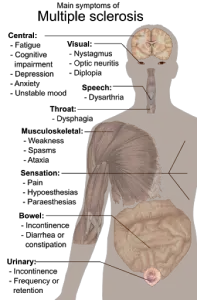Can a Plant-based Diet Reverse Multiple Sclerosis?
Around one million Americans live with multiple sclerosis (MS), according to the National Multiple Sclerosis Society. While that number may seem small as compared with the overall population, it’s still a serious condition. So can a plant-based diet reverse multiple sclerosis?

MS is an autoimmune disease, which is why it still needs a lot more research. As far as the treatment goes, it’s possible to control the symptoms through medication and lifestyle changes. The latter, of course, has little to no side effects, so it is the preferred treatment for this condition.
The symptoms of MS can be affected by what you eat or drink. So as soon as the disease onsets, your doctor will advise you to make changes to your diet. Plant-based diets remain popular for treating MS, as they have shown favorable results in the past.
What is Multiple Sclerosis (MS)?
Multiple sclerosis (MS) is a disease of the central nervous system in which the immune system attacks myelin. Myelin is the protective layer over the nerve fibers. This results in problems in communication as your brain is not able to communicate with the body properly.
The disease can also permanently damage nerves over time. It’s marked by inflammation, lesions, and scar tissues. Different people face different levels of severity of the disease. In highly severe cases, the person can have difficulty walking and functioning normally.
Types of MS
MS has different forms depending on the symptoms and the frequency/occurrence of those symptoms:
Relapsing-remitting MS (RRMS)
This is the most common form of MS, where it relapses then remits, and the cycle continues. In relapse periods, the symptoms are active, while in the remission period, the symptoms are mild or non-existent. This type doesn’t really progress, rather has an episodic nature.
Primary Progressive MS (PPMS)
In this MS, the disease is simply progressive, and there’s no remission. If symptoms keep getting worse from the very onset, it’s considered primary progressive. There can be brief periods of remission, but it’s not exactly remission rather just inactiveness of progression.
Secondary Progressive MS (SPMS)
When RRMS turns into a PPMS, it’s considered SPMS. In the beginning, it relapses and remitting periodically, but with time the disease also starts to get worse. Even though there are remissions, one won’t feel much difference.
Symptoms of MS
MS symptoms can vary by person to person, especially depending on where exactly the nerves are getting affected. Similarly, the severity can also vary by person to person and even symptom to symptom.
 Here are the common MS signs and symptoms:
Here are the common MS signs and symptoms:
- Fatigue
- Dizziness
- Numbness in limbs (one side of the body at a time)
- Difficulty balancing
- Difficulty with vision
- Partial or complete loss of vision
- Tremors
- Electric sensations with certain movements of the neck
- Problems with sexual functions
- Difficulty focusing
- Chronic pain
MS Risk Factor
Since MS is an autoimmune disease, no one really knows what exactly causes the immune system to attack the myelin. However, scientists have identified certain risk factors that may result in this condition:
Family History
Is multiple sclerosis hereditary? Not necessarily, but scientists have identified certain genes that may increase the risk. So if you have a family that has a history of MS, your risk is slightly higher.
Sex
Women are two to three times more likely to get MS than men.
Race
Caucasian people are at a higher risk of MS than other races. Comparatively, people of Asian, African, or Native American descent have a lower risk.
Vitamin D Deficiency
A deficiency in Vitamin D is also linked with the risk of MS. If you don’t get enough Vitamin D through sun exposure or fortified food products, you may be at risk.
Smoking
Smoking may also be linked with MS because those who experience pre-MS symptoms and smoke are likely to actually get relapsing-remitting MS.
Other Autoimmune Diseases and Infections
Certain autoimmune diseases like thyroid disease, psoriasis, type 1 diabetes, may also increase the risk of this autoimmune disease. Similarly, infections that affect the nervous system, such as Epstein-Barr, are also a risk factor.
How is MS Diagnosed?
There are many tests that may be performed to diagnose MS. Oftentimes, these tests help rule out other possible causes of the MS. Your doctor will take your medical history and perform certain blood tests and a neurological exam.
The diagnosis of MS may involve:
- MRI
- Spinal Tap
- Blood tests
- Visual evoked potentials (VEP) test
Can a Plant-based Diet Reverse Multiple Sclerosis?
MS is essentially incurable, which means it’s a lifelong chronic condition. However, new studies and real-life examples are showing promise in a plant-based diet for reversing it. A plant-based diet reverses MS in the sense that it helps send the symptoms into remission for longer periods. As a result, the patient is able to get their life back to normalcy.
Meat, Dairy, and MS
Studies go as far back as the 1940s that demonstrate the efficacy of a plant-based diet in treating and reversing MS. Many studies were conducted after World War II when it was noticed that the cases of MS dropped during the war years. Scientists believed it was the rationing of food, particularly meat and dairy, that resulted in that scenario.

An American Journal of Clinical Nutrition study of 1950 linked MS with saturated fat. Two decades later, another study in the British Journal of Preventive and Social Medicine found similar links. This study used data from over 20 countries and found that food groups such as meat and dairy with higher contents of fat resulted in higher instances of MS.
While these studies may not be considered as advanced because of old technology, more recent studies also showed similar results. Also, these studies were focused on MS in the adult population. So what about MS in children?
A large team of researchers studied the effects of diet on children with MS. They found that an increase of just 10 percent in total fat resulted in a whopping increase of 56 percent in the risk of relapse in these children. That risk was an astonishing 237 percent, with just 10 percent of saturated fat. This study, which was published in the Journal of Neurology, Neurosurgery, and Psychiatry, just gave a glimpse of how risky saturated fats are for people with MS and even those without it.
These studies give enough evidence that animal-based products, especially those high in saturated fats, are a risk factor for MS. But what about a plant-based diet? These studies do shed some light on a plant-based diet as it’s free of saturated fats. But no work comes closer to the work of Dr. Roy Swank when it comes to plant-based diets and MS.

Plant-based Foods and MS
Dr. Roy Swank’s work expanded over several decades. While most studies were experimental, Swank compiled data from observational studies. He has published hundreds of papers that showed how the consumption of fat affected MS.
He studied 144 individuals with MS for nearly 50 years and published data from his observation every few years. One group in his study complied with a low-fat diet, and the other group didn’t. The former group showed improved physical activity while the latter mostly lacked it. Also, 80 percent of those who didn’t comply died of MS-related causes. In hindsight, 20 percent of those in the compliant group died.
Dr. Michael Greger of NutritionFacts.org explains in detail in his article about MS why that must be the case. He explains how a plant-based diet helps treat autoimmune diseases such as MS. The possible explanation lies in IGF-1 levels and its effect on self-reactive white blood cells.
More recently, Dr. John McDougall conducted a study at Oregon University, testing the so-called McDougall diet on MS patients. This low-fat, plant-based diet only relied on whole foods. The trial result showed that the patients eating the McDougall diet showed weight loss, low cholesterol, and had less fatigue. Although the MRI outcomes did not show much change, the remission of symptoms was promising.
In Australia, Professor George Jelinek has started a program for reversing MS, similar to Dr. Dean Ornish’s program for reversing heart disease. What’s interesting is that he himself has MS, so he’s actually practicing what he’s preaching.
It focuses on a plant-based diet, exercise, and Vitamin D supplementation. The results have so far shown improvement in the quality of life of the patients after taking his educational sessions.
Recommended Foods to Eat for MS
Can a plant-based diet reverse multiple sclerosis? It depends on how careful you are with your diet. If you pay attention and formulate a plant-based diet based on healthy whole foods, and especially stay away from saturated fats, you can send it into remission.
Then there’s also the question of managing inflammation, which you can do with anti-inflammatory plant-based foods.
Here are some of the important ones:
Fruits and Vegetables for Antioxidants
It goes without saying that you need to eat at least eight to nine servings of fruits and vegetables in a day. These contain all the necessary nutrients, but also antioxidants that prevent cell damage by free radicals. There are just so many vegetables and fruits, you can choose to eat more of the ones you like.
Whole Grains for Fiber
There’s a strong link between gut health and the immune system. In fact, changes in your gut flora may cause immune disorders. Since MS is an autoimmune disease, it makes sense to ensure you have a healthy gut flora that promotes a stronger immunity and nervous system.
So make sure to add a variety of whole grains to your diet.
Kimchi and Sauerkraut for Probiotics
Much like fiber, fermented foods can provide you with necessary probiotics to improve your gut bacteria. Fermented foods like kimchi and sauerkraut can help increase good bacteria and decrease bad bacteria, creating the right balance. Plus, it doesn’t hurt that both these foods are delicious.

Olive Oil and Garlic for Inflammation
The polyunsaturated fatty acids in olive oil have anti-inflammatory effects, which is crucial for suppressing inflammation caused by this autoimmune disease. In fact, a lack of polyunsaturated fatty acids in diet may increase the risk of MS.
Similarly, garlic is a super food when it comes to inflammation.
Flax Seeds for Healthy Fats and Lignans
You need a good deal of omega-3 fatty acids, which flaxseeds are quite rich in. They also contain lignans, which are phytochemicals that reduce inflammation. Adding flaxseeds to your cereal, mustard, mayonnaise, or bread may help control inflammation caused by MS.
Can MS Kill You?
MS doesn’t really kill people, but it can reduce life expectancy by as much as 7.5 years. It really comes down to individual cases and how the disease is progressing. Progressive MS is, of course, more harmful.
In recent years, thanks to more research into different kinds of treatments, it seems like life expectancy is improving. Nevertheless, it can significantly affect the quality of life, which is a whole other thing.
More research is ongoing, and treatments are being tested, so there’s hope that the treatment will get even better in the future. A plant-based diet remains a viable solution for MS patients to live a full and healthy life without the fear of dying from its complications.
Wrap Up
 With so much research pointing towards animal protein and fat being a risk factor for MS, it’s clear that a plant-based diet can help reverse multiple sclerosis. Or, at the very least, minimize your risk for MS.
With so much research pointing towards animal protein and fat being a risk factor for MS, it’s clear that a plant-based diet can help reverse multiple sclerosis. Or, at the very least, minimize your risk for MS.
For both prevention and treatment, the low-fat nature of a plant-based diet is highly feasible for MS. It will take time and dedication, but one can send symptoms into permanent remission.
Focus solely on whole foods, and avoid processed foods, even if they are plant-based. In other words, avoid things like flour and white rice. Similarly, also avoid sugars as they can exacerbate your symptoms.










